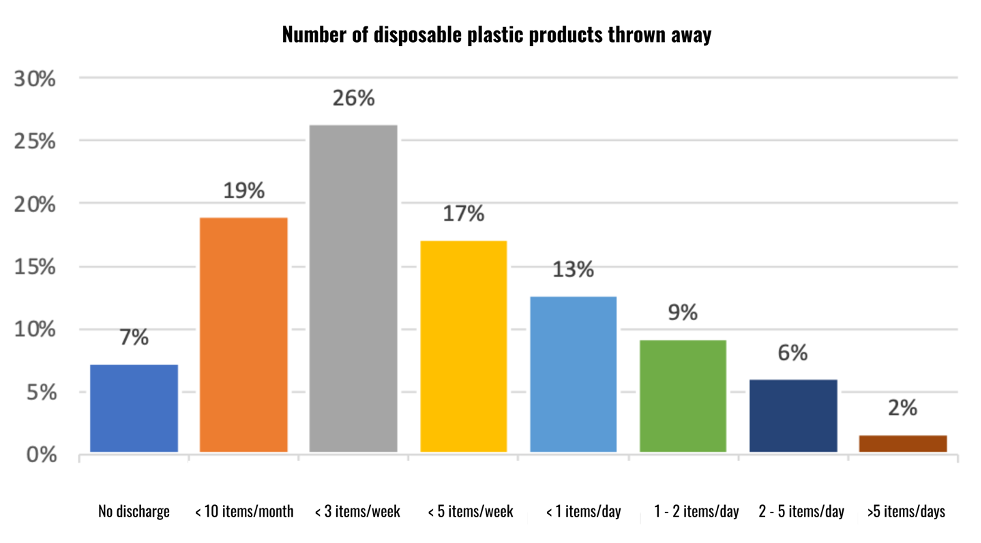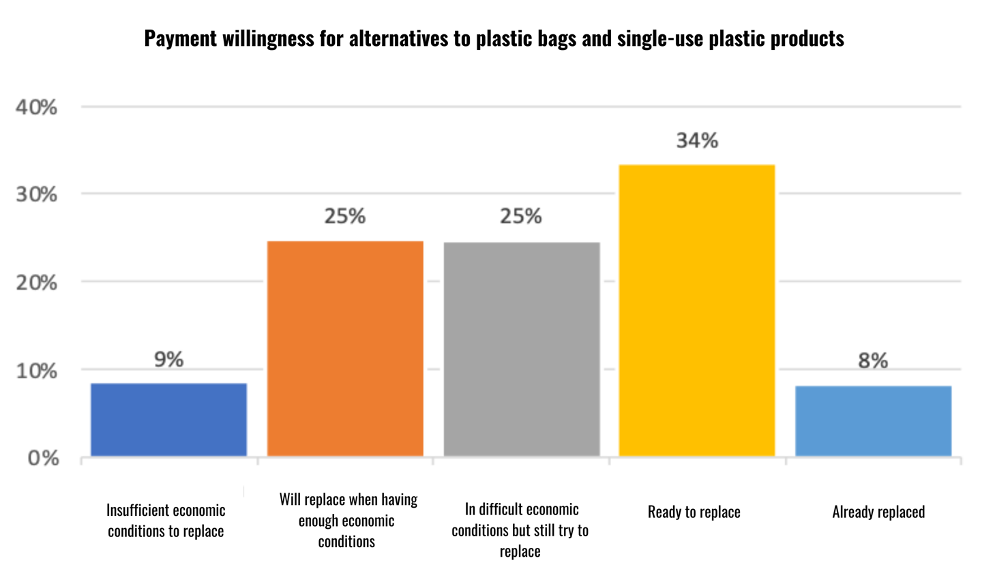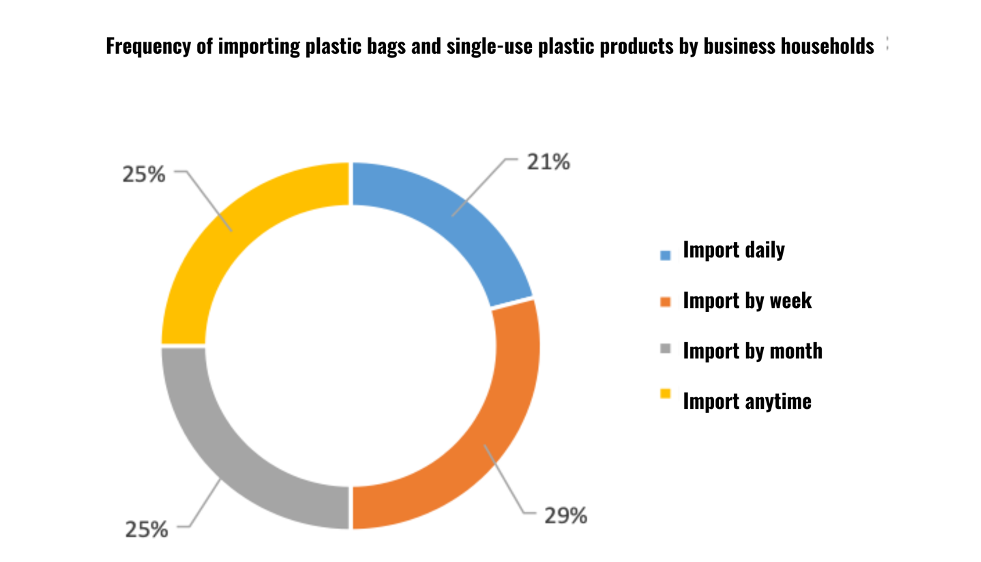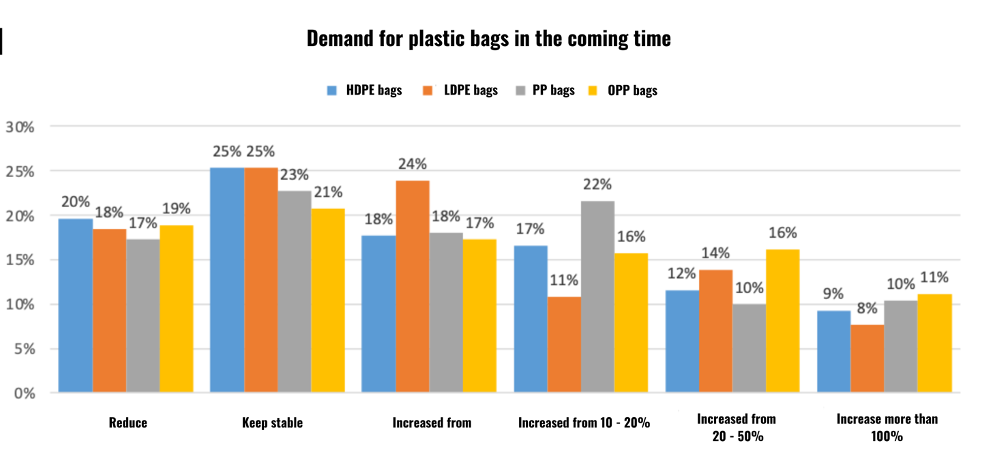

24/04/2024
Waste from non-biodegradable plastic bags and single-use plastic products with sustainable characteristics in nature are posing a significant threat to the environment and human health. Therefore, the implementation of the study "Research on scientific basis, propose solutions to reduce, eliminate the use and discharge of non-degradable plastic bags, single-use plastic products in markets, supermarkets and shopping centers" will contribute to Vietnam's efforts to combat plastic waste. The main research method of the study is based on the study of documents, international experience, and surveying the current situation in Vietnam. The study has investigated and surveyed the current use and discharge of non-biodegradable plastic bags and single-use plastic products in the retail distribution system (including markets, supermarkets, and shopping centers) in Vietnam. Based on international experiences and the actual situation of using and disposing of plastic bags, single-use plastic products at markets, supermarkets, and commercial centers in our country, the study has clearly demonstrated the urgent matters that Vietnam needs to address in the near future. On the basis of theoretical and practical framework, the study has proposed 6 solution groups with tasks and activities to be implemented in order to reduce and eliminate the use and discharge of non-biodegradable plastic bags and single-use plastic products at markets, supermarkets, and shopping centers. The results of the study need to be widely disseminated to help government agencies as well as businesses and consumers have appropriate solutions to reduce and eventually eliminate non-biodegradable plastic bags, single-use plastic products and replaced by other biodegradable, environmentally friendly products in business activities and consumption at commercial business establishments.
Keywords: Plastic bags, plastic products, environment, trade.
JEL Classification: F18, Q21, Q53
Received: 15th January 2024; Revised: 20th February 2024; Accepted: 15th March 2024
1. INTRODUCTION
Plastic is a lightweight, hygienic, and durable material that can be molded in a variety of ways and used in various applications. Most plastics are non-biodegradable, they only photodegrade into small pieces called microplastics. The plastic products mentioned in this study are plastics of fossil origin, not plastics of biological origin. Among single-use plastic products, plastic bags are the world's leading products in popularity among consumers and are considered a symbol of "disposable" culture.
In the effort to protect the earth from plastic waste, many countries in the world have been applying regulations to limit and eventually ban the use of single-use plastic products such as cups, plates, cutlery, spoons, etc., and replaced with environmentally friendly products. The ban on single-use plastics has been coming into force in many countries in the world today. Since 2020, 170 countries have committed to "significantly reducing" the use of plastic from now until 2030.
International experience gained includes both successes and failures in reducing and eliminating the use and discharge of nondegradable plastic bags and single-use plastic products in distribution systems, including countries that have succeeded in voluntarily agreeing to reduce nondegradable plastic bags and single-use plastic products such as Austria and South Korea; countries that have succeeded in taxing and collecting fees for using plastic bags such as Ireland and Japan; countries that have succeeded in implementing a ban on single-use plastic products and nondegradable plastic bags include Antigua and Barbuda, Australia, and the United States; countries failed to implement the ban on single-use plastic products and nondegradable plastic bags such as Rwanda, South Africa, Bangladesh and countries with similar characteristics to Vietnam such as China and Thailand.
Currently in the world as well as in Vietnam, the use of plastic bags and plastic products in business and consumption activities is quite popular because of the conveniences they bring. When released into the environment, a plastic bag can take up to 500 -1000 years to completely decompose. So to date, there are more than 9.1 billion tons of plastic waste accumulated on earth. The abuse of non-biodegradable plastic bags and single-use plastic products has left various negative consequences on human health, the environment and ecosystem, etc, hindering the sustainable development goal set by the international community and nations.
According to data from the Ministry of Natural Resources and Environment, the amount of plastic waste and plastic bags in Vietnam is currently quite high, accounting for about 8-12% of household solid waste, approximately 2.5 million tons/year. Counting plastic bags alone, it is estimated that Vietnam uses and disposes of more than 30 billion bags each year. Plastic bags are still the top priority choice for packaging and transporting goods in supermarkets, shopping centers, traditional markets, etc. The use of plastic bags and disposable plastic products is still common and it is mainly due to insufficient awareness of the harmful effects of plastic waste by production enterprises, distributors, and consumers; Propaganda work has not been organized regularly and is not highly effective; the distribution system for environmentally friendly products has not yet been established; the implementation of solutions and policies to reduce and eliminate the use and discharge of plastic bags and single-use plastic products, as well as policies and solutions to support and promote enterprises manufacturing products using environmentally friendly packaging in the retail distribution system are lacking and have numerous gaps...
To realize the goals and orientations of reducing and eliminating plastic bags and single-use plastic products, replacing them with environmentally friendly products in markets, supermarkets, and shopping centers, it is necessary to research and find solutions, develop policies to widely apply from production, distribution to consumption activities in the retail distribution system. For the above reasons, the project "Research on scientific basis, propose solutions to reduce, eliminate the use and discharge of non-biodegradable plastic bags, single-use plastic products at markets, supermarkets and shopping centers" focuses on main topics as follows: (1) Theoretical and practical basis, international experience in minimizing and eliminating the use and discharge of nondegradable plastic bags, single-use plastic products; (2) Evaluate the current status of policies on minimizing, eliminating the use and discharge of nondegradable plastic bags and single-use plastic products in Vietnam; (3) Investigate, survey and evaluate the current status of use and discharge of nondegradable plastic bags and single-use plastic products at markets, supermarkets and shopping centers in Vietnam; (4) Viewpoints, orientations and proposed solutions to reduce and eliminate the use and discharge of nondegradable plastic bags and single-use plastic products at markets, supermarkets and shopping centers in Vietnam in the coming time.
2. METHODOLOGY
- Document research method, inheriting previous research results: Systematic collection of secondary documents to clarify the theoretical and practical basis for minimizing, eliminating the use and discharge of non-degradable plastic bags, single-use plastic products at markets, supermarkets, and shopping centers in Vietnam.
- Statistical, analytical, and collected methods: Process, analyze, and synthesize collected information and data and evaluate the current status of the use and discharge of nondegradable plastic bags and single-use plastic products at markets, supermarkets, and shopping centers in Vietnam.
- Comparison and forecasting methods: Used to evaluate the current situation, compare and forecast among different development periods.
- Investigation and survey methods: To consolidate and update practical information and data to serve the analysis and assessment of the current situation of use and discharge of nondegradable plastic bags and single-use plastic products at markets, supermarkets, and shopping centers in Vietnam. The actual investigation and survey method is conducted on the basis of pre-built questionnaires, interviews, discussions, and work with 3 groups of survey subjects: (1) consumers; (2) enterprises and business households; (3) management agencies and organizations in 6 provinces and cities across the country including Ha Noi, Hai Phong, Da Nang, Can Tho, Ho Chi Minh City and Dak Lak.
- Workshop method, asking for expert opinions: Organizing workshops to get opinons from leaders, scientists, and environmental experts working at universities and research institutes, relevant ministries and agencies, businesses, and relevant organizations and individuals to supplement and complete the final research results report.
3. RESEARCH RESULTS
The survey shows some features of the current situation of use and discharge of nondegradable plastic bags and single-use plastic products in the retail distribution system including markets, supermarkets, and shopping centers in Vietnam currently, specifically:
Regarding the number of single-use plastic products discarded, since the price of single-use plastic products is still low as compared to consumers' payment willingness, a large amount of plastic waste still arises. According to survey results, up to 26% of surveyed consumers said they threw away less than 3 items per week, and only 7% said they did not throw away single-use plastic items. The number of single-use plastic items discarded by consumers is presented specifically in the chart below.

Figure 1. Number of disposable plastic products thrown away
Regarding payment willingness for solutions to replace plastic bags and single-use plastic products, survey results show that up to 67% of surveyed consumers said they are willing to pay for environmentally friendly solutions to replace plastic bags and single-use plastic products, of which only 8% have made substitutions. The remaining 34% of consumers feel that economic conditions are still difficult so they will not be willing to pay, because current alternative solutions are still much higher priced than affordable disposable plastic products with the distribution for free.

Figure 2. Payment willingness for alternatives to plastic bags and single-use plastic products
Regarding the consumption of plastic bags and single-use plastic products for enterprises and business households at markets, supermarkets, and shopping centers, survey results of enterprises and business households at markets and supermarkets, commercial centers in 6 provinces and cities: Ha Noi, Hai Phong, Da Nang, Dak Lak, Can Tho and Ho Chi Minh City show that up to 41% of respondents said that the source of importing plastic bags and single-use plastics products is from distribution units. Details on the source and frequency of importing plastic and single-use plastic bags are shown in the following Figure.

Figure 3. Frequency of importing plastic bags and single-use plastic products by business households
Survey results show that the demand for all types of disposable plastic products of enterprises and business households tends to increase in the near future with a quite high selection rate, detailed in the following Figure:

Figure 4. Demand for plastic bags in the coming time
4. RECOMMENDATION
Given the current situation of using and disposing of plastic bags and single-use plastic products at markets, supermarkets, and shopping centers and lessons learned, urgent issues need to be resolved in the coming time, including:
Firstly, it is necessary to continue promoting propaganda and awareness raising for consumers, retailers, and manufacturers about the harmful effects of plastic bags on the economy, environment, and public health, as well as orientations in the production and use of environmentally friendly bags.
Secondly, develop and deploy policies and general management measures, implement specific solutions in parallel, from guiding and encouraging organizations and businesses, especially in markets and commercial centers to set a limit on the use of nondegradable plastic bags and replace them with environmentally friendly materials.
Thirdly, research and apply scientific advances, reuse technology transfer, and recycle non-degradable plastic bag waste and single-use plastic items into useful, environmentally friendly products.
Fourthly, seek international cooperation and apply advanced models of plastic waste management in general and at markets, supermarkets, and shopping centers in particular. Provide additional funding sources and encourage socialization of separation at source, recycling of household solid waste, and minimizing the use of nondegradable plastic bags.
Fifthly, develop a roadmap of specific tasks and activities to be carried out to limit the use and discharge of non-degradable plastic bags and single-use plastic products, and replace them with eco-friendly products that are able to decompose quickly in natural conditions (such as wood, rattan, bamboo...).
Sixthly, promote the implementation of inspection and supervision of business activities, production, import, distribution, and use of nondegradable plastic bags and single-use plastic products, especially in retail establishments such as markets, shopping centers, and supermarkets across the country.
5. CONCLUSION
In summary, we could not deny the role of plastic bags and disposable plastic products in modern life, but it is time to look back at the consumption and disposal of single-use plastic products and nondisposable plastic bags because they are causing serious consequences to organisms, the environment, the landscape, and human health. The project "Research on scientific basis, propose solutions to reduce, eliminate the use and discharge of non-degradable plastic bags, single-use plastic products in markets, supermarkets, and shopping centers" was carried out to contribute to Vietnam's efforts to combat plastic waste.
Given the results of the survey on the use and discharge of nondegradable plastic bags and single-use plastic products in the retail distribution system in Vietnam in the current period, the project has evaluated the current situation of use of non-degradable plastic bags, single-use plastic products in markets, supermarkets, and shopping centers and draw out urgent issues that need to be resolved in the near future.
In addition, through international experiences collected on banning/restricting the use and emission of nondegradable plastic bags and single-use plastic products in the retail distribution system of goods, the research team drew lessons for Vietnam and proposed solutions to reduce and eliminate the use and discharge of non-degradable plastic bags and single-use plastic products in markets, supermarkets, and shopping centers in Vietnam in the coming time.
Given the research results, the research team has proposed tasks and activities that need to be implemented to reduce and eliminate the use of nondegradable plastic bags and single-use plastic products in markets, supermarkets, and shopping centers in Vietnam in the coming time.
Research results need to be widely disseminated in the form of handbooks and guidance documents to help the government as well as businesses and consumers have appropriate solutions to minimize and eliminate non-degradable plastic bags and single-use plastic products and replace them with other biodegradable, environmentally friendly products in business and consumption activities at commercial business units.
Nguyễn Hoàng Khiêm
Domestic Market Department
Ministry of Industry and Trade of Vietnam
(Source: Vietnam Environment Administration Magazine, English Edition I-2024)
REFERENCES
1. Andrea Chothia (2016), SA’s plastic bag tax diverted https://www.iol.co.za/business-report/economy/sas-plastic-bag-tax- diverted-2045284
2. Australian Capital Territory Government, Australia (2011). Plastic bag ban. https://www.environment. act.gov.au/waste/plastic-bag-ban
3. Babin, Janet (2017). New York City Reinstates Styrofoam Ban. WNYC News, 13 May. http://www. wnyc.org/story/new-york-city-reinstates-styrofoam- ban/
4. National waste report (2020) page 4 https://www.environment.gov.au/protection/waste/national-waste-reports/2020
5. Biopolymer (2021), Efforts to ban single-use plastic products in the world https://biopolymer.vn/tin-tuc-su-kien/cam-nhua-dung-1-lan-tren-the-gioi/
6. Ministry of Industry and Trade (2020), Vietnam imports plastic materials from more than 30 markets. http://vsi.gov.vn/vn/tin-cong-nghiep-ho-tro/viet-nam-nhap-khau-nguyen-lieu-nhua-tu-hon-30-thi-truong--c7id1661.html
7. Buchanan, Kelly (2021), Australia: Ban on single-use plastic products enacted in Australian capital territory https://www.loc.gov/item/global-legal-monitor/2021-05-10/australia-ban-on-single-use-plastic-products-enacted-in-australian-capital-territory/
8. California office of environmental health Hazard assessment (1986), Proposition 65: Safe drinking water and toxic enforcement act of 1986 https://oehha.ca.gov/proposition-65
9. Convery, Frank, Simon McDonnell, and Susana Ferreira (2007). The most popular tax in Europe? Lessons from the Irish plastic bags levy. Environmental Resource Economy, Vol. 38, pp 1-11.